人教精通版小学英语六年级上册单元知识点总结(全册)(完美版)
- 格式:docx
- 大小:18.94 KB
- 文档页数:6
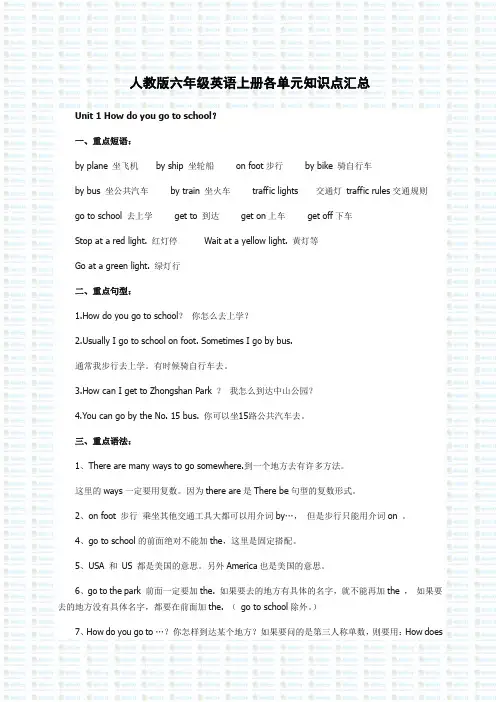
人教版六年级英语上册各单元知识点汇总Unit 1 How do you go to school?一、重点短语:by plane 坐飞机by ship 坐轮船on foot步行by bike 骑自行车by bus 坐公共汽车by train 坐火车traffic lights 交通灯traffic rules交通规则go to school 去上学get to 到达get on上车get off下车Stop at a red light. 红灯停Wait at a yellow light. 黄灯等Go at a green light. 绿灯行二、重点句型:1.How do you go to school?你怎么去上学?ually I go to school on foot. Sometimes I go by bus.通常我步行去上学。
有时候骑自行车去。
3.How can I get to Zhongshan Park ?我怎么到达中山公园?4.You can go by the No. 15 bus. 你可以坐15路公共汽车去。
三、重点语法:1、There are many ways to go somewhere.到一个地方去有许多方法。
这里的ways一定要用复数。
因为there are是There be句型的复数形式。
2、on foot 步行乘坐其他交通工具大都可以用介词by…,但是步行只能用介词on 。
4、go to school的前面绝对不能加the,这里是固定搭配。
5、USA 和US 都是美国的意思。
另外America也是美国的意思。
6、go to the park 前面一定要加the. 如果要去的地方有具体的名字,就不能再加the ,如果要去的地方没有具体名字,都要在前面加the. (go to school除外。
)7、How do you go to …?你怎样到达某个地方?如果要问的是第三人称单数,则要用:How doeshe/she…go to …?8、反义词:get on(上车)---get off(下车)near(近的)—far(远的)fast(快的)—slow(慢的)because(因为)—why(为什么)same(相同的)—different(不同的)9、近义词:see you---goodbye sure---certainly---of course10、频度副词:always 总是,一直usually 通常often经常sometimes 有时候never 从来不Unit 2 Where is the science museum?一、重点短语:library 图书馆post office 邮局hospital医院cinema 电影院bookstore书店science museum科学博物馆turn left向左转turn right 向右转go straight 直行north北south南east东west西next to靠近、与……。
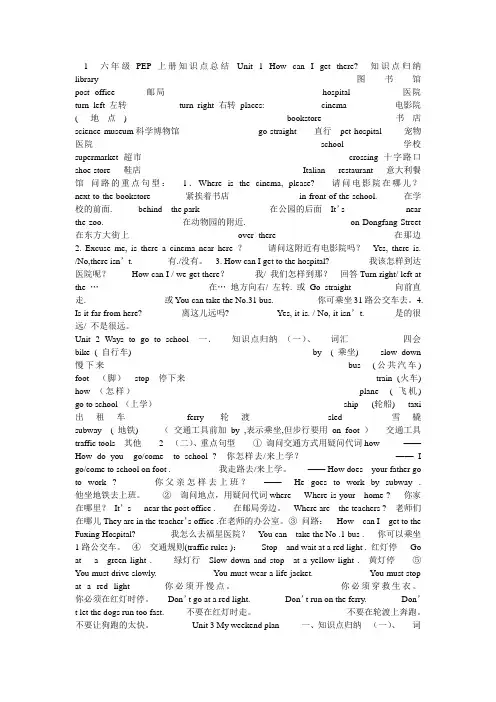
1 六年级PEP上册知识点总结Unit 1 How can I get there? 知识点归纳library 图书馆post office 邮局hospital 医院turn left 左转turn right 右转places: cinema 电影院( 地点) bookstore 书店science museum科学博物馆go straight 直行pet hospital 宠物医院school 学校supermarket 超市crossing 十字路口shoe store 鞋店Italian restaurant 意大利餐馆问路的重点句型:1.Where is the cinema, please? 请问电影院在哪儿?next to the bookstore 紧挨着书店in front of the school. 在学校的前面. behind the park 在公园的后面It’s near the zoo. 在动物园的附近. on Dongfang Street 在东方大街上over there 在那边2. Excuse me, is there a cinema near here ?请问这附近有电影院吗?Yes, there is. /No,there isn’t. 有./没有。
3. How can I get to the hospital? 我该怎样到达医院呢?How can I / we get there?我/ 我们怎样到那?回答Turn right/ left at the …在…地方向右/ 左转. 或Go straight 向前直走. 或You can take the No.31 bus. 你可乘坐31路公交车去。
4. Is it far from here? 离这儿远吗? Yes, it is. / No, it isn’t. 是的很远/ 不是很远。
Unit 2 Ways to go to school 一.知识点归纳(一)、词汇四会bike ( 自行车) by ( 乘坐) slow down 慢下来bus (公共汽车) foot (脚)stop 停下来train (火车) how (怎样)plane ( 飞机) go to school (上学)ship (轮船) taxi 出租车ferry 轮渡sled 雪橇subway ( 地铁) (交通工具前加by ,表示乘坐,但步行要用on foot )交通工具traffic tools 其他 2 (二)、重点句型①询问交通方式用疑问代词how ——How do you go/come to school ? 你怎样去/来上学?——I go/come to school on foot . 我走路去/来上学。
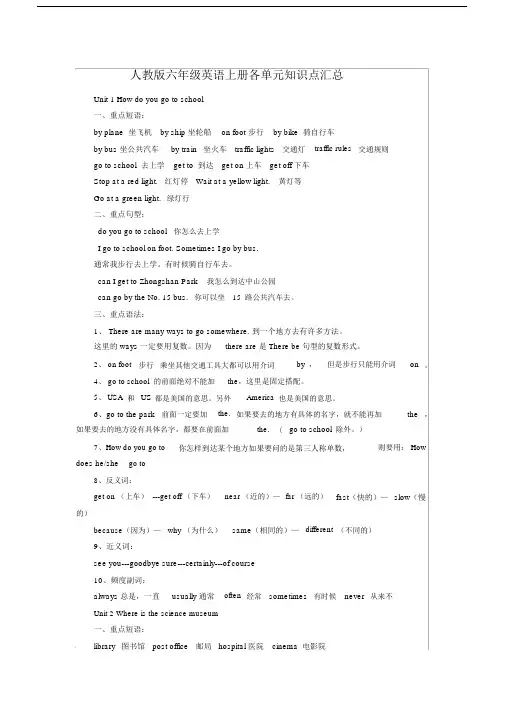
人教版六年级英语上册各单元知识点汇总Unit 1 How do you go to school一、重点短语:by plane 坐飞机by ship 坐轮船on foot 步行by bike 骑自行车traffic rules 交通规则by bus 坐公共汽车by train坐火车traffic lights交通灯go to school 去上学get to 到达get on 上车get off 下车Stop at a red light.红灯停Wait at a yellow light.黄灯等Go at a green light.绿灯行二、重点句型:do you go to school你怎么去上学I go to school on foot. Sometimes I go by bus.通常我步行去上学。
有时候骑自行车去。
can I get to Zhongshan Park我怎么到达中山公园can go by the No. 15 bus.你可以坐15路公共汽车去。
三、重点语法:1、 There are many ways to go somewhere. 到一个地方去有许多方法。
这里的 ways 一定要用复数。
因为there are 是 There be 句型的复数形式。
2、 on foot 步行乘坐其他交通工具大都可以用介词by,但是步行只能用介词on 。
4、 go to school 的前面绝对不能加the,这里是固定搭配。
5、 USA 和US 都是美国的意思。
另外America 也是美国的意思。
6、go to the park 前面一定要加the. 如果要去的地方有具体的名字,就不能再加the ,如果要去的地方没有具体名字,都要在前面加the. (go to school 除外。
)7、How do you go to 你怎样到达某个地方如果要问的是第三人称单数,则要用: How does he/she go to8、反义词:get on (上车)---get off (下车)near (近的)—far (远的)fast(快的)—slow(慢的)because(因为)—why (为什么)same(相同的)—different (不同的)9、近义词:see you---goodbye sure---certainly---of course10、频度副词:always 总是,一直usually 通常often 经常sometimes 有时候never 从来不Unit 2 Where is the science museum一、重点短语:library图书馆post office邮局hospital 医院cinema 电影院bookstore 书店science museum 科学博物馆turn right向右转go straight 直行north 北east 东 west 西 next to 靠近、与。
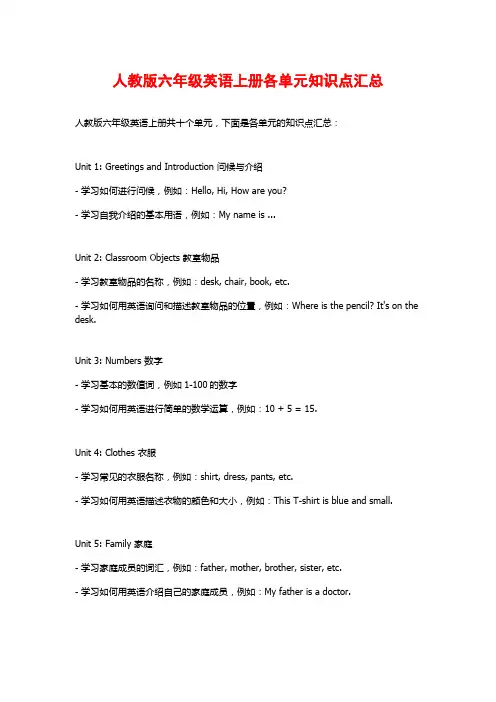
人教版六年级英语上册各单元知识点汇总人教版六年级英语上册共十个单元,下面是各单元的知识点汇总:Unit 1: Greetings and Introduction 问候与介绍- 学习如何进行问候,例如:Hello, Hi, How are you?- 学习自我介绍的基本用语,例如:My name is ...Unit 2: Classroom Objects 教室物品- 学习教室物品的名称,例如:desk, chair, book, etc.- 学习如何用英语询问和描述教室物品的位置,例如:Where is the pencil? It's on the desk.Unit 3: Numbers 数字- 学习基本的数值词,例如1-100的数字- 学习如何用英语进行简单的数学运算,例如:10 + 5 = 15.Unit 4: Clothes 衣服- 学习常见的衣服名称,例如:shirt, dress, pants, etc.- 学习如何用英语描述衣物的颜色和大小,例如:This T-shirt is blue and small.Unit 5: Family 家庭- 学习家庭成员的词汇,例如:father, mother, brother, sister, etc.- 学习如何用英语介绍自己的家庭成员,例如:My father is a doctor.Unit 6: Food 食物- 学习常见的食物名称,例如:apple, banana, bread, etc.- 学习如何用英语描述食物的味道和口感,例如:This banana is sweet and tasty.Unit 7: School Life 学校生活- 学习学校生活的用语,例如:go to school, have classes, play games, etc.- 学习如何用英语描述学校生活的常见活动,例如:I have English class at 9 o'clock.Unit 8: Hobbies and Free Time 爱好和业余时间- 学习常见的爱好词汇,例如:sing, dance, swim, etc.- 学习如何用英语询问和回答关于业余时间的问题,例如:What do you do in your free time? I like playing basketball.Unit 9: Daily Routine 日常生活- 学习描述日常活动的词汇,例如:get up, have breakfast, go to bed, etc.- 学习如何用英语描述自己的日常作息安排,例如:I get up at 7 o'clock in the morning.Unit 10: Travel and Places 旅行和地方- 学习关于旅行和地方的基本词汇,例如:train, bus, hotel, etc.- 学习如何用英语询问和指路,例如:Excuse me, how can I get to the post office? 希望对你有帮助!。
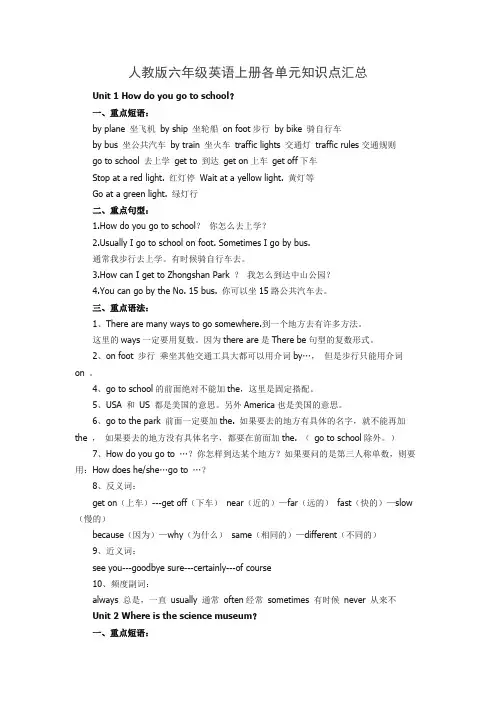
人教版六年级英语上册各单元知识点汇总Unit 1 How do you go to school?一、重点短语:by plane 坐飞机by ship 坐轮船on foot步行by bike 骑自行车by bus 坐公共汽车by train 坐火车traffic lights 交通灯traffic rules交通规则go to school 去上学get to 到达get on上车get off下车Stop at a red light. 红灯停Wait at a yellow light. 黄灯等Go at a green light. 绿灯行二、重点句型:1.How do you go to school?你怎么去上学?ually I go to school on foot. Sometimes I go by bus.通常我步行去上学。
有时候骑自行车去。
3.How can I get to Zhongshan Park ?我怎么到达中山公园?4.You can go by the No. 15 bus. 你可以坐15路公共汽车去。
三、重点语法:1、There are many ways to go somewhere.到一个地方去有许多方法。
这里的ways一定要用复数。
因为there are是There be句型的复数形式。
2、on foot 步行乘坐其他交通工具大都可以用介词by…,但是步行只能用介词on 。
4、go to school的前面绝对不能加the,这里是固定搭配。
5、USA 和US 都是美国的意思。
另外America也是美国的意思。
6、go to the park 前面一定要加the. 如果要去的地方有具体的名字,就不能再加the ,如果要去的地方没有具体名字,都要在前面加the. (go to school除外。
)7、How do you go to …?你怎样到达某个地方?如果要问的是第三人称单数,则要用:How does he/she…go to …?8、反义词:get on(上车)---get off(下车)near(近的)—far(远的)fast(快的)—slow (慢的)because(因为)—why(为什么)same(相同的)—different(不同的)9、近义词:see you---goodbye sure---certainly---of course10、频度副词:always 总是,一直usually 通常often经常sometimes 有时候never 从来不Unit 2 Where is the science museum?一、重点短语:library 图书馆post office 邮局hospital医院cinema 电影院bookstore书店science museum科学博物馆turn left向左转turn right 向右转go straight 直行north北south南east东west西next to靠近、与……。
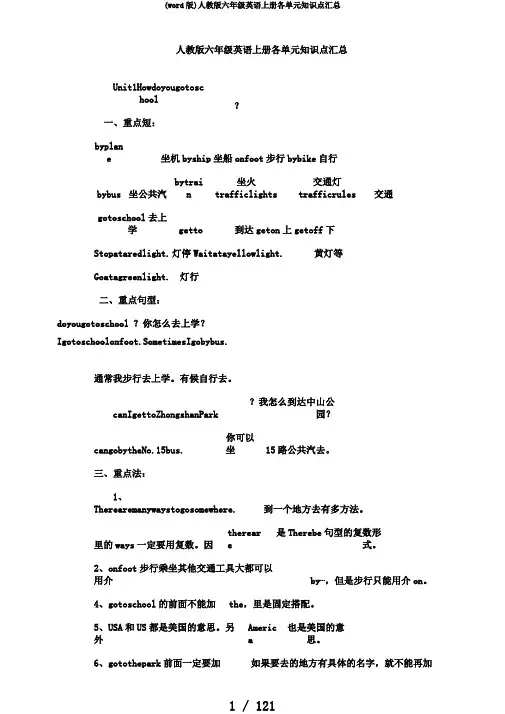
人教版六年级英语上册各单元知识点汇总Unit1Howdoyougotoschool?一、重点短:byplane坐机byship坐船onfoot步行bybike自行bybus坐公共汽bytrain坐火trafficlights交通灯trafficrules交通gotoschool去上学getto到达geton上getoff下Stopataredlight.灯停Waitatayellowlight.黄灯等Goatagreenlight.灯行二、重点句型:doyougotoschool ?你怎么去上学?Igotoschoolonfoot.SometimesIgobybus.通常我步行去上学。
有候自行去。
canIgettoZhongshanPark ?我怎么到达中山公园?cangobytheNo.15bus.你可以坐15路公共汽去。
三、重点法:1、Therearemanywaystogosomewhere.到一个地方去有多方法。
里的ways一定要用复数。
因thereare是Therebe句型的复数形式。
2、onfoot步行乘坐其他交通工具大都可以用介by⋯,但是步行只能用介on。
4、gotoschool的前面不能加the,里是固定搭配。
5、USA和US都是美国的意思。
另外America也是美国的意思。
6、gotothepark前面一定要加如果要去的地方有具体的名字,就不能再加the.the,如果要去的地方没有具体名字,都要在前面加the.〔gotoschool除外。
〕7、Howdoyougoto⋯?你怎到达某个地方?如果要的是第三人称数,要用:Howdoeshe/she ⋯goto⋯?8、反:geton〔上〕---getoff 〔下〕near〔近的〕—far〔的〕fast〔快的〕—slow〔慢的〕because〔因〕—why 〔什么〕same〔相同的〕—different〔不同的〕9、近:seeyou---goodbyesure---certainly---ofcourse10、度副:always 是,一直usually 通常Unit2Whereisthescience museum often常?sometimes有候never从来不一、重点短:librarypostoff ice 局hospital医院cinema影院booksto re店sciencemuseu m 科学博物turnleft向左turnright向右gostraight 直行north北south南eastwest 西nextto靠近、与⋯⋯。
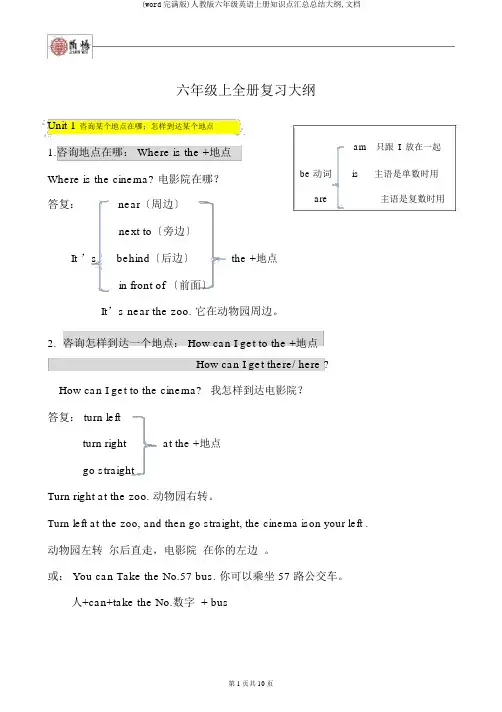
六年级上全册复习大纲Unit 1 咨询某个地点在哪;怎样到达某个地点1.咨询地点在哪: Where is the +地点Where is the cinema? 电影院在哪?答复:near〔周边〕am只跟I放在一起be 动词is主语是单数时用are主语是复数时用next to〔旁边〕It ’s behind〔后边〕the +地点in front of 〔前面〕It’s near the zoo. 它在动物园周边。
2.咨询怎样到达一个地点: How can I get to the +地点How can I get there/ here ?How can I get to the cinema?我怎样到达电影院?答复: turn leftturn right at the +地点go straightTurn right at the zoo. 动物园右转。
Turn left at the zoo, and then go straight, the cinema ison your left .动物园左转尔后直走,电影院在你的左边。
或: You can Take the No.57 bus. 你可以乘坐 57 路公交车。
人+can+take the No.数字 + busUnit2 到达某个地点的交通方式1. How do某人go(come)to school ?某人怎么去〔来〕学校doesHow do you go to school?你怎么去学校?How does she come to school? 她怎么来学校的?答复:某人 + go(goes) + to school + by+ 交通工具come(comes)I go to school on foot.She goes to school by bus.2.某人 + must + 动词原形某人必定People on bikes must wear one.骑自行车的人必定戴一个。
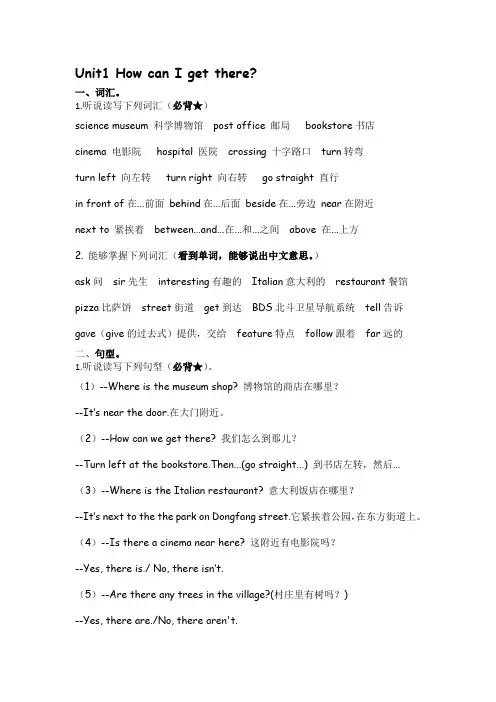
Unit1 How can I get there?一、词汇。
1.听说读写下列词汇(必背★)science museum 科学博物馆post office 邮局bookstore书店cinema 电影院hospital 医院crossing 十字路口turn转弯turn left 向左转turn right 向右转go straight 直行in front of在...前面behind在...后面beside在...旁边near在附近next to 紧挨着between...and...在...和...之间above 在...上方2.能够掌握下列词汇(看到单词,能够说出中文意思。
)ask问sir先生interesting有趣的Italian意大利的restaurant餐馆pizza比萨饼street街道get到达BDS北斗卫星导航系统tell告诉gave(give的过去式)提供,交给feature特点follow跟着far远的二、句型。
1.听说读写下列句型(必背★)。
(1)--Where is the museum shop? 博物馆的商店在哪里?--It’s near the door.在大门附近。
(2)--How can we get there? 我们怎么到那儿?--Turn left at the bookstore.Then...(go straight...) 到书店左转,然后... (3)--Where is the Italian restaurant? 意大利饭店在哪里?--It’s next to the the park on Dongfang street.它紧挨着公园,在东方街道上。
(4)--Is there a cinema near here? 这附近有电影院吗?--Yes, there is./ No, there isn’t.(5)--Are there any trees in the village?(村庄里有树吗?)--Yes, there are./No, there aren't.-Where is the hospital?-It’s in front of the cinema.-Where is the cinema?-It's in front of the hospital.2.听说认读下列句子(能够认读,理解中文意思)。
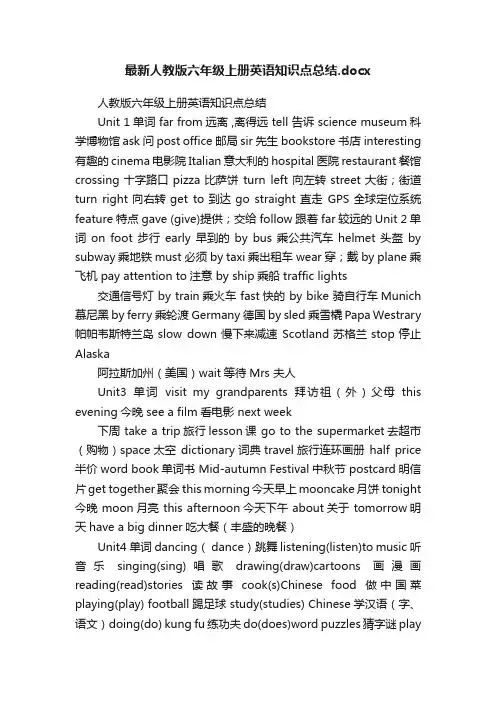
最新人教版六年级上册英语知识点总结.docx人教版六年级上册英语知识点总结Unit 1单词 far from远离 ,离得远 tell 告诉 science museum科学博物馆 ask问 post office邮局 sir先生bookstore书店interesting 有趣的cinema电影院Italian意大利的hospital医院restaurant餐馆crossing十字路口pizza比萨饼turn left向左转street大街;街道turn right向右转get to到达go straight直走GPS全球定位系统feature特点 gave (give)提供;交给follow跟着 far较远的Unit 2单词on foot步行early早到的by bus乘公共汽车helmet头盔by subway乘地铁must 必须 by taxi乘出租车wear穿;戴 by plane乘飞机 pay attention to注意 by ship乘船 traffic lights交通信号灯 by train乘火车 fast快的 by bike 骑自行车Munich 慕尼黑 by ferry乘轮渡Germany德国 by sled乘雪橇 Papa Westrary 帕帕韦斯特兰岛slow down慢下来减速Scotland苏格兰stop停止Alaska阿拉斯加州(美国)wait等待Mrs 夫人Unit3单词visit my grandparents拜访祖(外)父母this evening今晚 see a film看电影 next week下周 take a trip旅行lesson课 go to the supermarket去超市(购物)space太空dictionary词典travel旅行连环画册half price 半价 word book单词书 Mid-autumn Festival中秋节 postcard明信片get together聚会 this morning今天早上mooncake月饼 tonight 今晚 moon月亮 this afternoon今天下午 about关于 tomorrow明天have a big dinner吃大餐(丰盛的晚餐)Unit4单词 dancing( dance)跳舞 listening(listen)to music听音乐singing(sing)唱歌drawing(draw)cartoons画漫画reading(read)stories读故事cook(s)Chinese food做中国菜playing(play) football踢足球 study(studies) Chinese学汉语(字、语文)doing(do) kung fu练功夫do(does)word puzzles猜字谜playsports做运动go(goes)hiking远足watch TV看电视hobby(复hobbies)爱好climbing(climb)mountains爬山pen pal笔友play the pipa弹琵琶 jasmine flower茉莉花 Good idea好主意amazing令人惊讶的Canberra堪培拉shall表征求意见goal射门 club俱乐部join加入share分享Unit5单词 factory worker工厂工人university大学 postman邮递员gym体育馆businessman商人if如果police officer警察reporter记者fisherman渔民use使用scientist科学家type打字pilot飞行员 quickly迅速地 coach 教练 secretary秘书 country国家;乡村boat船 head teacher校长sea大海stay保持Unit 6单词angry生气的bad 邪恶的;坏的afraid害怕hurt (使)受伤sad难过的ill 有病;不舒服worried担心的;发愁的wrong有毛病happy高兴的should应该 see a doctor看病 feel觉得;感到do more exercise多做运动 well健康;身体好wear warm clothes穿暖户的衣服sit坐 take a deep breath深吸一口气grass草坪 count to ten数到十hear 听见 chase追赶ant蚂蚁 mice( mouse 的复数)老鼠worry担心;担忧stuck陷住, 无法移动pull拉;拽mud泥everyone每人新六上英语重点句子☆为四会句子U1 ☆1、☆Where is the museum shop?博物馆的商店在哪儿?☆☆2 、It ’ s near the door.在大门附近.☆3 、 I want to buy a postcard.我想买一张明信片 .4 、 I want to send it today.我想今天寄出 .5 、I ’ ll ask.我去问问 .6 、 Wow, a talking robot!哇!一个讲话机器人 .7 、 What a great museum!好棒的一家博物馆!8 、 There is a pet hospital in my city.在我的城市有一家宠物医院 .9 、Wu Yifan and Robin are looking at some robots.吴一凡和罗宾正在看一些机器人.☆ 10 、 How can we get there?我们怎么到那儿?☆☆ 11、 Turn left at the bookstore.在书店左转.☆12 、 I know a great Italian restaurant.我知道一家很棒的意大利餐厅.13 、 Chen Jie is trying to be a tour guide for Oliver in Beijing.陈洁正试图给奥利佛当北京的向导.14 、Wu Yinfan’ s grandpa gave Robin a new feature.吴一凡的爷爷给罗宾增加了一个新功能.15 、 My new GPS works!我的全球定位系统起作用了.16 、 My stomach hurts.我的胃不舒服了.U2 ☆1、?你怎么来学校的?☆☆2 、 .通常我走路来.☆☆ 3 、Don’t go at the red light!别闯红灯!☆☆4 、I must pay attention to the traffic lights!我必须注意交通信号灯!☆☆5 、 In the USA people on bikes must wear one.在美国骑自行车的人必须戴(头盔). ☆U3☆1、What are you going to do tomorrow?你明天打算做什么?☆☆ 2 、I ’m going to have an art lesson.我要上美术课. ☆☆ 3 We’ re going to draw some pictur es in Renmin Park.我们要到人民公园去画画. ☆4 、I ’ m going to see a film.我打算去看电影.5 、I ’ m going to visit my grandparents.我打算去看望外祖父母 .☆ 6 、Where are you going?你们打算去哪儿?☆☆ 7 、We’re going to the cinema.我们打算去电影院. ☆☆ 8 、 When are you going?你们什么时候去?☆9 、I ’我打算去买一本新漫画书.10 、What are you going to buy?你打算买什么?11 、My aunt is going to make mooncakes.我的阿姨将做一些月饼. -12 、My grandma will tell us a story about Chang’ 我e.奶奶(外婆)将会给我们讲嫦娥的故事.☆ U4 1、What are Peter’s hobbies?彼得有什么爱好?☆☆ 2 、He likes reading stories.他喜欢读故事. ☆3 、 He lives on a farm, so sometimes he reads to the cows.4、他住在农场上,有时候他给奶牛讲故事. 5 、He likes doing kung fu and swimming.他喜欢练武术和游泳.6、He also likes singing.他还喜欢唱歌.☆ 7 、 Does he live in Sydney?他住在悉尼吗?☆☆ 8 、No, he doesn’ t不.,他没有.☆☆ 9Does he like doing word puzzles and going hiking?他喜欢猜字谜和远足吗?☆☆ 10 、Yes, he does.是的,他喜欢.☆11、He lives in Australia, but he studies Chinese.他住在澳大利亚, 但是他学习中文.U5 ☆1、What does he do?他是做什么的?☆☆ 2 、He’ s a businessman.他是商人.☆3、He often goes to other countries.他经常去其他国家.4、What does your mother do?你妈妈是做什么的?5 、She ’ s a head teacher.她是一名校长.6 、 Do you want to be a head teacher, too?你也想成为一名校长吗?7、I want to be a taxi driver.我想成为一名出租车司机.☆ 8 、 Where does he work?他在哪儿工作?☆☆ 9 、 He works at sea.他在海上工作. ☆☆ 10 、 How does he go to work?他怎么上班?☆☆ 11 、 He goes to work by bike.他骑自行车上班. ☆12、He has a very healthy life.他有一个很健康的生活.13 、 He works very hard and stays healthy.他工作很努力, 身体很健康 .14 、 She works at a university.她在一所大学工作.U6 ☆1、They are afraid of him.它害怕它.☆☆ 2 、 The cat is angry with them.只猫很生气.☆3 、 Because the mice are bad.因老鼠很坏.4 、 They hurt people.他害人.5 、 Sarah is angry.拉很生气.6 、 The cat is ill.只猫生病了.7 、 Sarah and the cat are worried.拉和猫咪很着急.☆ 8 、 What's wrong?怎么了?☆☆ 9 、Your father is ill.你爸爸生病了. ☆☆ 10 、 He should see a doctor this morning.他今天早上去看病. ☆☆11 、Don ’ t be sad. 心!☆12、 How does Dad feel now?爸爸在感怎么?13 、 Not well.不是很好 .14、 What should I do?我做什么?15、 You should wear warm clothes.你穿上保暖的衣服 .16 、 You should do more exercise.你做更多的运 .17、 You should take a deep breath and count to ten.你深呼吸然后数到十 .18、 Do more exercise.做更多的运 .19、 Wear warm clothes.穿上温暖的衣服 .20、 Take a deep breath.深呼吸 .名:drive— driver 司机clean— cleaner 清工sing—singer 歌手 teach— teacher 教write — writer 作家 dance— dancer 舞蹈家football player 足球运三形式化构成法例 A. 一般在尾加 -s help— helps make– makes cook—cooks play —plays read—reads write—writes B. 以o,s,x,ch,sh,尾的在尾加-es go —goes do —does pass —passes fix– fixes teach—teaches watch— watches wash—washes C 以音字母加y 尾的, 先yi, 再加-es fly –flies study–studies carry -- carries E. 不化(牢) have---has I have a word book.我有一本 .He has a word book.他有一本第三人称数He She It个人名(Amy,Zhang Peng,Oliver)个称呼(My father,My mother,My teacher,My friend,My pen pal?).另:我( I )用 am, 你( you)用are,is用于他(he )、她(she)、它(it ), 我(we), 你( you ) , 他( they)都用 are.— ing形式化构成法例 A. 一般加 -ing work— working study —studying play — playing watch — watching draw— drawing do —doing sing— singing read—reading B.以不音的 e 尾的去e 后加-ing live—living write—writing dance--dancing make —making take--taking C.双写最后一个字母加ing stop--stopping run -- running swim -- swimming put— putting sit—sitting人教版六年级上册英语知识点总结。
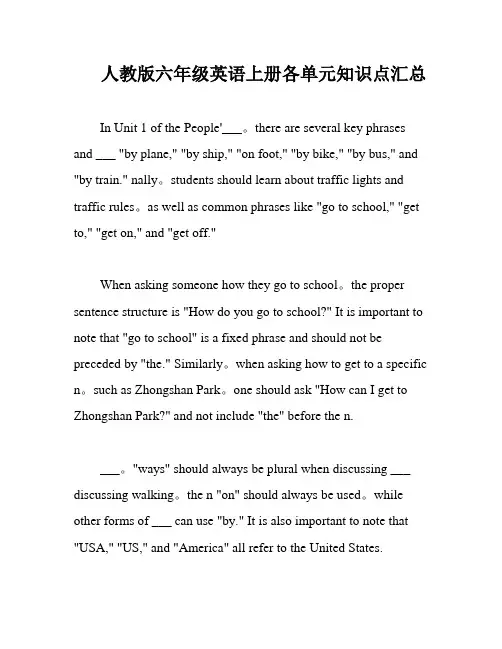
人教版六年级英语上册各单元知识点汇总In Unit 1 of the People'___。
there are several key phrases and ___ "by plane," "by ship," "on foot," "by bike," "by bus," and "by train." nally。
students should learn about traffic lights and traffic rules。
as well as common phrases like "go to school," "get to," "get on," and "get off."When asking someone how they go to school。
the proper sentence structure is "How do you go to school?" It is important to note that "go to school" is a fixed phrase and should not be preceded by "the." Similarly。
when asking how to get to a specific n。
such as Zhongshan Park。
one should ask "How can I get to Zhongshan Park?" and not include "the" before the n.___。
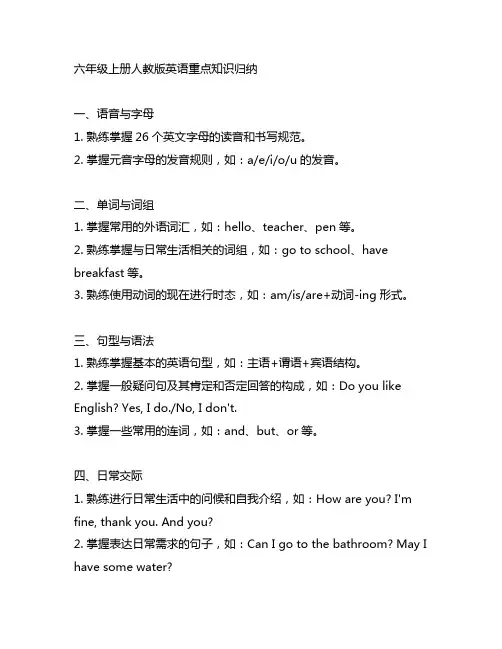
六年级上册人教版英语重点知识归纳一、语音与字母1. 熟练掌握26个英文字母的读音和书写规范。
2. 掌握元音字母的发音规则,如:a/e/i/o/u的发音。
二、单词与词组1. 掌握常用的外语词汇,如:hello、teacher、pen等。
2. 熟练掌握与日常生活相关的词组,如:go to school、have breakfast等。
3. 熟练使用动词的现在进行时态,如:am/is/are+动词-ing形式。
三、句型与语法1. 熟练掌握基本的英语句型,如:主语+谓语+宾语结构。
2. 掌握一般疑问句及其肯定和否定回答的构成,如:Do you like English? Yes, I do./No, I don't.3. 掌握一些常用的连词,如:and、but、or等。
四、日常交际1. 熟练进行日常生活中的问候和自我介绍,如:How are you? I'm fine, thank you. And you?2. 掌握表达日常需求的句子,如:Can I go to the bathroom? May I have some water?3. 熟练运用英语进行简单的交流,如:What's your name? My name is Lily.五、阅读与书写1. 能够读懂简单的英文短文或对话,并能够提取出关键信息。
2. 能够正确书写简单的英文句子或短文。
结语六年级上册人教版英语重点知识归纳主要包括语音与字母、单词与词组、句型与语法、日常交际以及阅读与书写等内容。
通过系统的学习和练习,学生能够掌握基本的英语知识,为后续学习打下良好的基础。
希望同学们能够认真对待英语学习,不断积累词汇和语法知识,不断提高听、说、读、写的能力,从而更好地应对英语学习中的挑战。
六年级上册人教版英语重点知识归纳六、语音与字母的扩展1. 学习发音时应注意元音和辅音字母的发音区别,如:cat中的/a/发音与dog中的/o/发音不同。
Unit1 How can I get there?一.重点science museum科学博物post office 局bookstore 店cinema影院hospital医院crossing 十字路口二.重点near=next to凑近in front of在⋯⋯前面turn left向走turn right向右go straight 直走三.重点句子(1〕--Where is the post office?局在哪里?--It ’s next to the museum它.凑近博物。
(2〕I want to buy a postcard. 我想要一明信片。
(3〕What a great museum! 多么棒的博物呀!(4〕There is a pet hospital in my city. 在我的城市里有一家物医院。
(5〕What an interesting film! 多么幽默的影呀!(6〕--How can I get there?我怎到达那处?--Turn left at the bookstore. Then turn right at the hospital.在店的候向左。
尔后在医院的候向右。
(7〕We are in front of the cinema我.在影院的前面。
(8〕Now we are behind the hospital. 在我在医院的后边。
(9〕Is it far from our school?它离我学校?(10〕Follow me, please! 跟着我!Unit2 Ways to go to school.一.重点词组walk=on foot步行by bus乘公共汽车by plane乘飞机by train乘火车by taxi乘出租车by ship 乘轮船by subway乘地铁slow down 减速二.重点句子(1〕--How do you come to school?你怎样来学校?--Usually I come on foot. Sometimes I come by bus.平时我步行上学。
人教版六年级英语上册各单元知识点汇总Unit 1 How do you go to school?一、重点短语:by plane 坐飞机by ship 坐轮船on foot步行by bike 骑自行车by bus 坐公共汽车by train 坐火车traffic lights 交通灯traffic rules交通规则go to school 去上学get to 到达get on上车get off下车Stop at a red light. 红灯停Wait at a yellow light. 黄灯等Go at a green light. 绿灯行二、重点句型:1.How do you go to school?你怎么去上学?ually I go to school on foot. Sometimes I go by bus.通常我步行去上学。
有时候骑自行车去。
3.How can I get to Zhongshan Park ?我怎么到达中山公园?4.You can go by the No. 15 bus. 你可以坐15路公共汽车去。
三、重点语法:1、There are many ways to go somewhere.到一个地方去有许多方法。
这里的ways一定要用复数。
因为there are是There be句型的复数形式。
2、on foot 步行乘坐其他交通工具大都可以用介词by…,但是步行只能用介词on 。
4、go to school的前面绝对不能加the,这里是固定搭配。
5、USA 和US 都是美国的意思。
另外America也是美国的意思。
6、go to the park 前面一定要加the. 如果要去的地方有具体的名字,就不能再加the ,如果要去的地方没有具体名字,都要在前面加the. (go to school除外。
)7、How do you go to …?你怎样到达某个地方?如果要问的是第三人称单数,则要用:How does he/she…go to …?8、反义词:get on(上车)---get off(下车)near(近的)—far(远的)fast(快的)—slow(慢的)because(因为)—why(为什么)same(相同的)—different(不同的)9、近义词:see you---goodbye sure---certainly---of course10、频度副词:always 总是,一直usually 通常often经常sometimes 有时候never 从来不Unit 2 Where is the science museum?一、重点短语:library 图书馆post office 邮局hospital医院cinema 电影院bookstore书店science museum科学博物馆turn left向左转turn right 向右转go straight 直行north北south南east东west西next to靠近、与……。
人教精通版小学英语六年级上册单元知识点总结(全册)(完美版)Unit1Igotoschoolat8:00.一、核心词汇1.描述日常活动的词汇cleanthewindow擦窗户cleanthedoor擦门cleanthefloor擦地板2.描述三餐的词汇breakfast早餐lunch午餐dinner晚餐3.描述时间的词汇morning早晨afternoon下午evening晚上; 傍晚4.频率副词often时常; 常常5.其他walk走; 步行every每一个easy容易difficult困难二、拓展词组描述日常活动的词组getup起床havebreakfast吃早餐gotoschool去上学havelunch 吃午饭gohome回家havedinner吃晚饭watchTV看电视gotobed睡觉cookbreakfast做早餐teachEnglish教英语takeawalk散步readstories读故事seeafilm看电影playthepiano弹钢琴三、核心句型1.Igetupat7:30inthemorning. 我早晨七点半起床。
解读:此句是一个陈述句, 用来描述我在某一时刻所做的事情。
举一反三:Igotoschoolat8:00inthemorning. 我早晨八点去上学。
她不在上午六点半起床。
2.Shedoesn’tgetupat6:30inthemorning.解读: 此句是一个否定句, 用来描述某人在某一时刻没有做的事情。
举一反三:Shedoesn’tgetupat6:40.她不在六点四十分起床。
3.— WhatdoyoudoonSaturdays? 你星期六做什么?— Ioftengoandseeafilmwithmyparents. 我经常和我的父母一起去看电影。
解读:这是用来询问对方某天做什么及其回答的句子。
举一反三:— Whatdoyoudoontheweekend? 你周末做什么?— Ioftendohomework. 我经常做作业。
4.DoessheplaythepianoonSaturdays? 她星期六弹钢琴吗?解读:这是一个一般疑问句。
用来询问某人是否做某事。
举一反三:Doesheplayfootballafterschool? 放学后他踢足球吗?5.— WhatdoesKatedoonSaturdays? 凯特星期六做什么?— Sheusuallyplaysthepiano. 她通常弹钢琴。
解读:这是用来询问某人某天做什么及其回答的句子。
举一反三:— Whatdoesshedoontheweekend? 她周末做什么?— Sheoftengoesswimming. 她经常游泳。
6.— DoyoureadstoriesonSundays? 你星期日读故事吗?—No,Idon’t.Ioftenplaythepiano.不。
我经常弹钢琴。
解读:这是用来询问对方某天是否做某事及其回答的句子。
举一反三:— Doyougetupat7:00everyday? 你每天七点起床吗?— Yes,Ido. 是, 是的。
四、了解句型1.I’minPrimarySix.我上小学六年级。
解读:这是用来描述某人所在年级的句子。
举一反三:I’minPrimaryFive.我上小学五年级。
2.MymotherisanEnglishteacher. 我妈妈是一名英语教师。
解读:这是用来描述某人所从事的职业的句子。
举一反三:Mysisterisadoctor. 我姐姐是一名医生。
3.Schoolbegins. 开始上课。
4.Schoolisover. 放学。
Unit2What’syourhobby?一、核心词汇1. 描述人物的词汇dad爸爸mum妈妈kid小孩baby婴儿2. 其他open开; 打开hobby爱好map地图box盒子colour颜色plant 植物; 种植flower花drink喝tea茶photo照片hungry饿的cry哭二、拓展词组描述兴趣爱好的词组collecttoycars收集玩具汽车collectstamps收集邮票collectmaps收集地图collectpicturecards收集图片gofishing去钓鱼plantflowers种花cookmeals做饭playcomputergames玩电脑游戏makedolls做布娃娃takephotos照相三、核心句型1. —What’syourhobby,Peter?你的爱好是什么, 彼得?— Myhobbyiscollectingstamps. 我的爱好是收集邮票。
解读:这是询问对方的爱好是什么及其回答的句子。
举一反三:—What’syourhobby?你的爱好是什么?— Myhobbyisplantingtrees. 我的爱好是种树。
2.Ilikeswimminginthepool. 我喜欢在池子里游泳。
解读:这是描述某人喜欢做某事的句子。
举一反三:Shelikesplantingflowers. 她喜欢种花。
3. —What’shedoing?他在做什么?— Mygrandpaisfishing. 我爷爷在钓鱼。
解读:这是询问某人在做什么及其回答的句子。
举一反三:— Whatishedoing? 他在做什么?—He’stakingphotos.他在照相。
你爸爸的爱好是什么?4. —What’syourdad’shobby?— Hishobbyisplantingflowers. 他的爱好是种花。
解读:这是询问某人的爱好是什么及其回答的句子。
你妈妈的爱好是什么?举一反三:—What’syourmother’shobby?— Herhobbyiscollectingstamps. 她的爱好是收集邮票。
5. — Whatareyouinterestedin,Lisa? 你对什么感兴趣, 莉萨?—I’minterestedinmakingdolls.我对做布娃娃感兴趣。
解读:这是询问对方对什么感兴趣及其回答的句子。
举一反三:—Whatisyourmotherinterestedin? 你妈妈对什么感兴趣?—She’sinterestedinmakingmeals.她对做饭感兴趣。
6.Areyouinterestedincooking? 你对烹饪感兴趣吗?解读:这是询问某人对某事是否感兴趣的句子。
举一反三:Isyourmotherinterestedintakingphotos? 你妈妈对照相感兴趣吗?四、了解句型1.CanIhavealook,please? 我能看一看吗?解读:这是询问某人是否能做某事的句子。
举一反三:CanIopenthedoor? 我能打开门吗?2.Whatasupercar! 多么棒的小汽车呀!解读:这是一个感叹句。
举一反三:Whatafineday! 多好的天啊!Unit3Wouldyouliketocometomybirthdayparty?一、核心词汇1.描述食物的词汇chocolate巧克力icecream冰激凌candy糖果2.其他time时间after在……后then那时me我 (I的宾格)bye再见kind 种类sure当然here在这里for给; 为了light点燃二、拓展词组1. 描述食物的词组star-shapedcake星形蛋糕heart-shapedcake心形蛋糕fruitpie 水果派2.描述生日活动的词组inviteyourfriendstoyourparty邀请朋友参加聚会celebrateyourbirthdaywithyourfriends与朋友庆祝生日giveabirthdaycardtoyourfriend向朋友赠送生日贺卡lightthecandles点蜡烛singthebirthdaysong唱生日歌makeawish许愿blowoutthecandles吹蜡烛cutthecake切蛋糕eatthecake吃蛋糕三、核心句型1.—Wouldyouliketocometomybirthdayparty? 你们想要来参加我的生日聚会吗?—Sure.I’dloveto.是的。
我很愿意参加。
解读:这是询问对方是否想要做某事及其回答的句子。
举一反三:— Wouldyouliketohaveacake? 你想吃一个蛋糕吗?— No,thanks. 不, 谢谢。
2.Pleasecometomybirthdayparty. 请来参加我的生日聚会。
解读:这是一个祈使句。
举一反三:Pleasehaveacake. 请吃一个蛋糕。
不要忘记写上你的朋友的名字,3.Don’tforgettowriteyourfriend’sname,andsignyourname, too.也要标记上你的名字。
解读:这是一个祈使句的否定形式。
举一反三:Don’thavetoomuchicecream.不要吃太多的冰激凌。
4.—Whatkindofcakewouldyoulike,Lisa? 你想要什么种类的蛋糕, 莉萨?—I’dlikeachocolatecake.我想要一个巧克力蛋糕。
解读:这是用来询问对方想要什么种类的某物及其回答的句子。